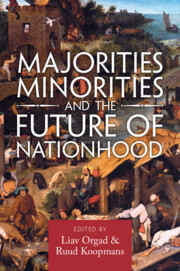Book contents
- Majorities, Minorities, and the Future of Nationhood
- Majorities, Minorities, and the Future of Nationhood
- Copyright page
- Contents
- Figures
- Tables
- Contributors
- Preface
- Acknowledgments
- A Note on the Cover
- 1 Majority–Minority Constellations
- 2 Are There Any Cultural Majority Rights?
- 3 Identity Not Culture
- 4 Nationhood, Multiculturalism, and the Ethics of Membership
- 5 Reconciling the Cultural Claims of Majorities and Minorities
- 6 Linking Minority Rights and Majority Attitudes
- 7 The Liberalism of Fear
- 8 Multiculturalism without Privileging Liberalism
- 9 Why Every Nation Should Nurture (a Thick and Inclusive) Nationalism
- 10 Populism and Cultural Majority Rights
- 11 Legitimate Populism and Liberal Overreach
- 12 The Causes of Populism and the Problem of Cultural Majority Rights
- Index
- References
7 - The Liberalism of Fear
The Second Coming
Published online by Cambridge University Press: 12 November 2022
- Majorities, Minorities, and the Future of Nationhood
- Majorities, Minorities, and the Future of Nationhood
- Copyright page
- Contents
- Figures
- Tables
- Contributors
- Preface
- Acknowledgments
- A Note on the Cover
- 1 Majority–Minority Constellations
- 2 Are There Any Cultural Majority Rights?
- 3 Identity Not Culture
- 4 Nationhood, Multiculturalism, and the Ethics of Membership
- 5 Reconciling the Cultural Claims of Majorities and Minorities
- 6 Linking Minority Rights and Majority Attitudes
- 7 The Liberalism of Fear
- 8 Multiculturalism without Privileging Liberalism
- 9 Why Every Nation Should Nurture (a Thick and Inclusive) Nationalism
- 10 Populism and Cultural Majority Rights
- 11 Legitimate Populism and Liberal Overreach
- 12 The Causes of Populism and the Problem of Cultural Majority Rights
- Index
- References
Summary
This chapter covers how the debate over multiculturalism has evolved over the past fifty years (1970–2020). While the twentieth century was marked by fear of minorities, the twenty-first century is marked by growing fears of majorities. The panic hovering over Europe is not concentrated on the political arrangements of the present but on a deep concern for the future of liberalism. This perception of the future turns social and cultural relationships into a zero-sum game. But is there a way out? The chapter ends with a discussion of contemporary majority and minority tensions in liberal societies and offers a common moral ground that allows managing these tensions, reaching a political compromise that is likely to leave both sides dissatisfied, but it is the most one can achieve. Perhaps the most important lesson of the last fifty years of rights-talk, the chapter argues, is that the expansion of the notion of rights offers an inclusive tool of social discourse but cannot offer a receipt for how societies should handle themselves. That remains the role of democratic process and for that they should be cherished and protected.
- Type
- Chapter
- Information
- Majorities, Minorities, and the Future of Nationhood , pp. 176 - 200Publisher: Cambridge University PressPrint publication year: 2022

